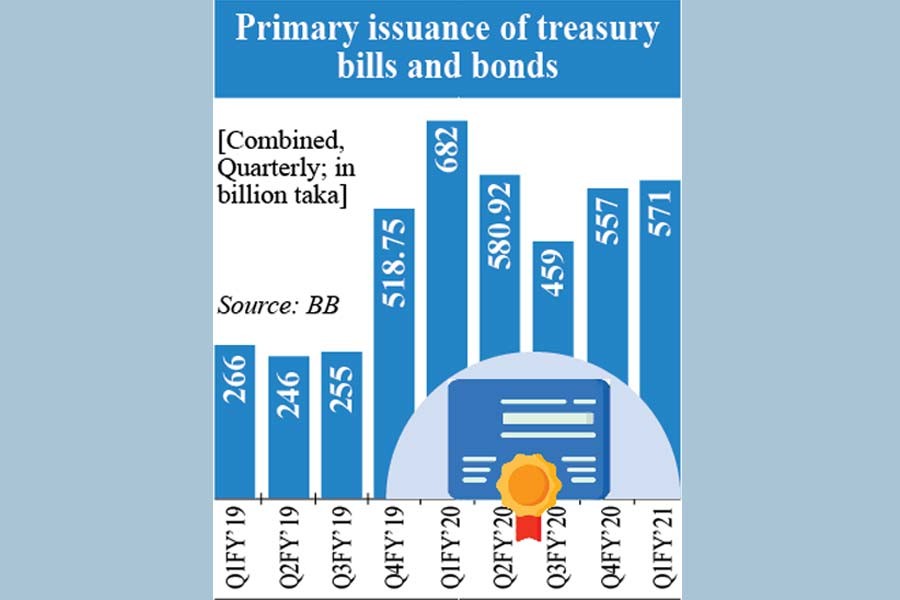Bangladesh Bank, on behalf of the government, issued lower amount of tradable fixed income securities in the first quarter of the current fiscal year (FY21) when compared with the same period of the past fiscal year.
Sluggish economic activities due to Covid-19 compelled the government to borrow more from the banking system although lower government development spending kept the lending at modest level.
Thus the central bank issued fixed income securities worth Tk 571.0 billion in July-September period of the current fiscal year while the value of primary issuance of total fixed income government securities was Tk 682.0 billion in the same period of FY20.
Thus primary issuance of these fixed income securities declined by around 16 per cent during the period under review.
Central bank statistics, however, added that combined primary issuance of treasury bills and bonds in the first quarter of FY21 increased by 2.51 per cent over the last quarter (April-June) of FY20.
To contain the spread of deadly coronavirus, Covid-19 to be precise, the government imposed unofficial lock-down in the last quarter of FY20.
At the beginning of the first quarter (July-September) of FY21, the government started to open-up economy gradually.
Nevertheless, collection of tax revenue through the National Board of Revenue (NBR) recorded a nominal 4.11 per cent growth in July-September period of the current fiscal year due to sluggish economic activities.
The shortfall of revenue collection is recorded at Tk 137.24 billion against the target of Tk 637.14 billion in the July-September period, according to the statistics of NBR.
Primary issuance of treasury bills, the short-term fixed income government securities, stood at Tk 342 billion in July-September period of current year.
T-bills are also considered as an instrument of money market as these are usually issued to meet short-term funding requirements of the government account.
The instruments are issued in scrip-less form at a discount and redeemed at the face value at maturity.
Again, in the first quarter of FY21, issuance of long-term securities or treasury bonds stood at Tk 229.0 billion.
T-bonds are issued by the government with a promise to pay periodic (half-yearly/quarterly) coupon payments and to repay the face value at maturity.
Central bank, on be-half of the government, issued both type of securities to adjust the government’s debt obligations.
Currently there are treasury bills with three maturity periods: 91-day, 182-day and 384-day while treasury bonds with five maturity periods: 2-year, 5-year, 10-year, 15-year and 20-year.
Bangladesh Bank statistics also showed that annual combined primary issuance of treasury bills and bonds jumped by 77.24 per cent in the past fiscal year (FY20) over the previous year (FY19).
In FY20, the central bank issued treasury bills worth Tk 1503.0 billion in the money market. At the same time, it issued Tk 775.92 billion worth of treasury bonds through the primary dealers.
Meanwhile, secondary trading of these securities in the first quarter of the current fiscal year recorded a big jump of 422 per cent over the last quarter of the past fiscal year (FY20).

Central banks statistics further showed that total value of secondary trading of treasury-bills and treasury-bonds stood at Tk 416.20 billion in the first quarter of FY21 which was Tk 79.71 billion in the last quarter (April-June) of FY20.
Again, the value of secondary trading of treasury bills and bonds was Tk 160.51 billion in the first quarter of FY20.


